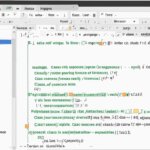Table of Contents
A thread is a fundamental concept in computer science that plays a vital role in CPU utilization. To comprehend the essence of a thread, it is crucial to differentiate it from a process. While a program represents a passive entity, a process is an active instance of execution. When a program is initiated, a process is born. Each process can consist of multiple threads, with each thread possessing its own set of resources.
Threads within the same process share the same memory space, enabling them to access each other’s variables. However, it is important to note that each thread has its own stack and program counter, allowing for independent execution of instructions. This level of autonomy enables threads to be executed parallelly, enhancing performance and responsiveness in a variety of applications.
Now, let us delve deeper into the differences between threads and processes to gain a more comprehensive understanding.
The Difference Between Threads and Processes
In the world of computer programs, threads and processes are two important units of execution. While they may seem similar, they possess distinct characteristics that set them apart. Let’s delve into the details of what differentiates threads from processes.
Processes:
A process can be thought of as a container for running code. It encompasses its own memory space, file handles, and other resources. Processes are isolated from each other and employ inter-process communication mechanisms to communicate. When two processes need to exchange information, they rely on methods such as message passing or shared files.
Threads:
Threads, on the other hand, are independent sequences of instructions that exist within a process. They share the same memory space, allowing them to access shared variables directly. This enables threads within a process to communicate with each other more efficiently. While processes have their own memory space, a new process incurs more overhead compared to creating a new thread.
When creating a new process, the entire address space needs to be duplicated. This includes duplicating the code, data, and system resources. However, when creating a new thread, only the stack and program counter need to be duplicated, reducing the overhead.
Here’s a visual representation of the relationship between threads and processes:
“Processes and threads are two important units of execution in a program. Processes are like containers, isolated from each other, while threads are sequences of instructions that share the same memory space within a process. Understanding the distinction between threads and processes is crucial for efficient program execution.”
Advantages and Use Cases of Threads
Threads offer numerous benefits and are widely utilized in diverse applications. One key advantage is the ability to achieve parallel processing, where multiple threads execute different segments of a program simultaneously, potentially enhancing overall performance. This enables tasks to be executed concurrently, allowing input/output operations to be handled while the main thread performs computation, thereby improving application responsiveness.
Furthermore, threads facilitate responsiveness in user interface applications by enabling independent processing of user interactions alongside other tasks. This ensures smooth and seamless user experiences. Common use cases for implementing threads range from multimedia applications, such as video editing software and video games, to web servers that can handle multiple simultaneous requests efficiently.
In addition, threads are extensively employed in scientific simulations, where parallel processing can significantly accelerate large-scale calculations and data analysis. Real-time systems, such as control systems in aerospace or automotive industries, also heavily rely on threads to maintain precise timing and responsiveness.
However, it is crucial to bear in mind that multithreading introduces unique challenges, particularly regarding synchronization and thread safety. These challenges must be carefully managed to avoid issues like race conditions or deadlocks, wherein two threads may compete for the same resources and lead to unpredictable outcomes. Nevertheless, with proper implementation and expertise, threads can greatly enhance the efficiency and performance of applications across a wide range of industries.
FAQ
What is a thread?
A thread is a basic unit of CPU utilization and a concept in computer science that refers to an independent sequence of instructions within a program that can be executed independently of other code.
What is the difference between a thread and a process?
While a program is a passive entity, a process is an active instance of execution. When a program is started, a process is created. Processes can have multiple threads, each with its own set of resources such as the program counter, registers, and stack pointer.
How do threads and processes differ?
Processes can be seen as containers for running code, with their own memory space, file handles, and other resources. Processes are isolated from each other and communicate through inter-process communication mechanisms. On the other hand, threads are independent sequences of instructions within a process that share the same memory space.
What are the advantages of using threads?
Threads have several advantages and are widely used in various applications. One major advantage is the ability to achieve parallel processing, where multiple threads execute different parts of a program simultaneously, potentially improving overall performance.
What are some common use cases for threads?
Common use cases for threads include multimedia applications, web servers, scientific simulations, and real-time systems.







